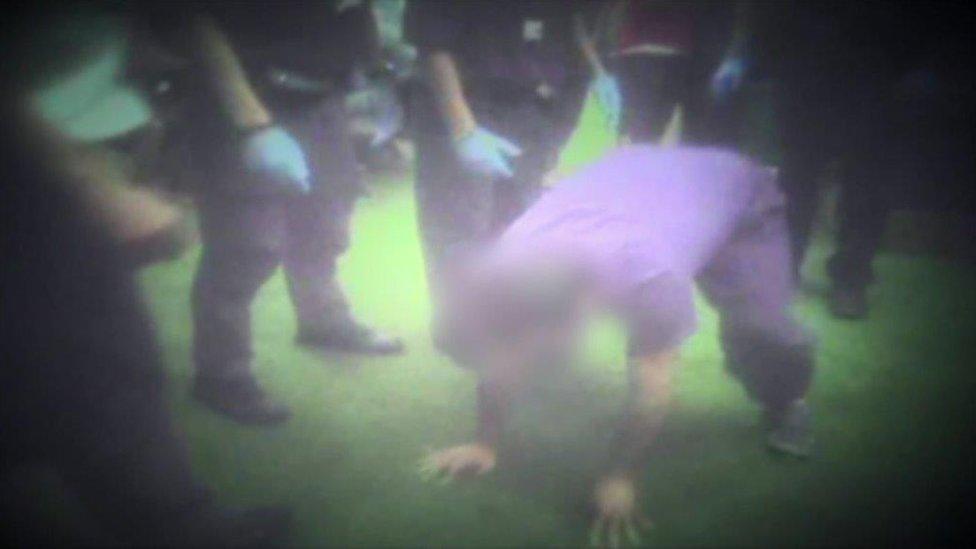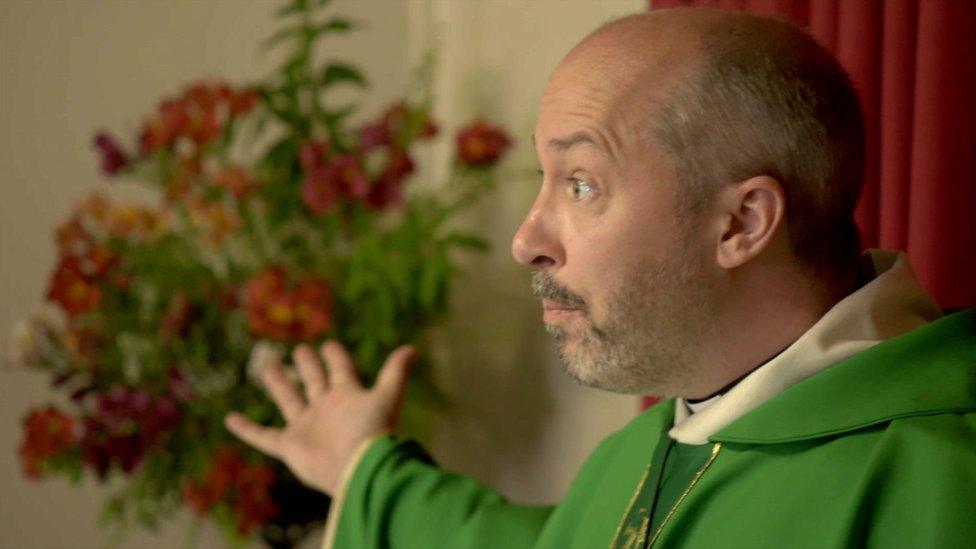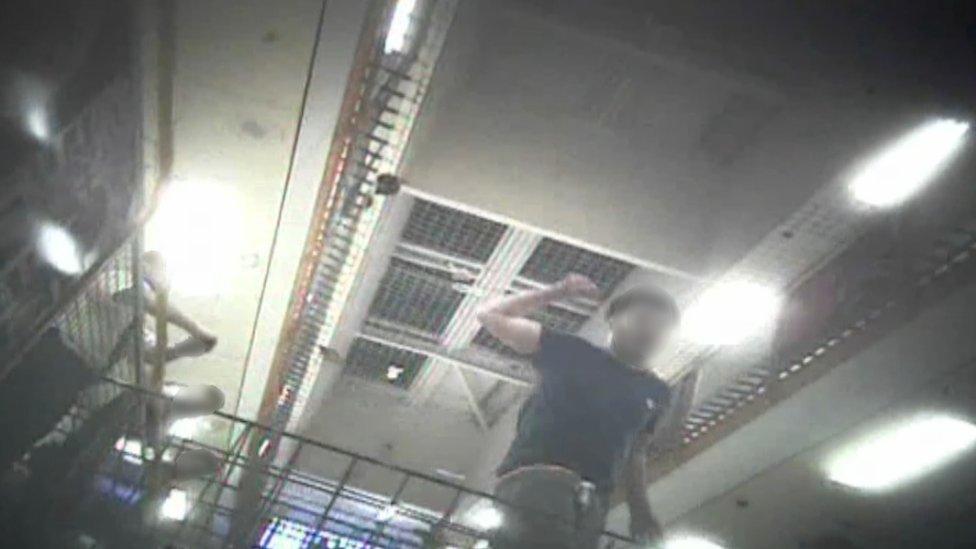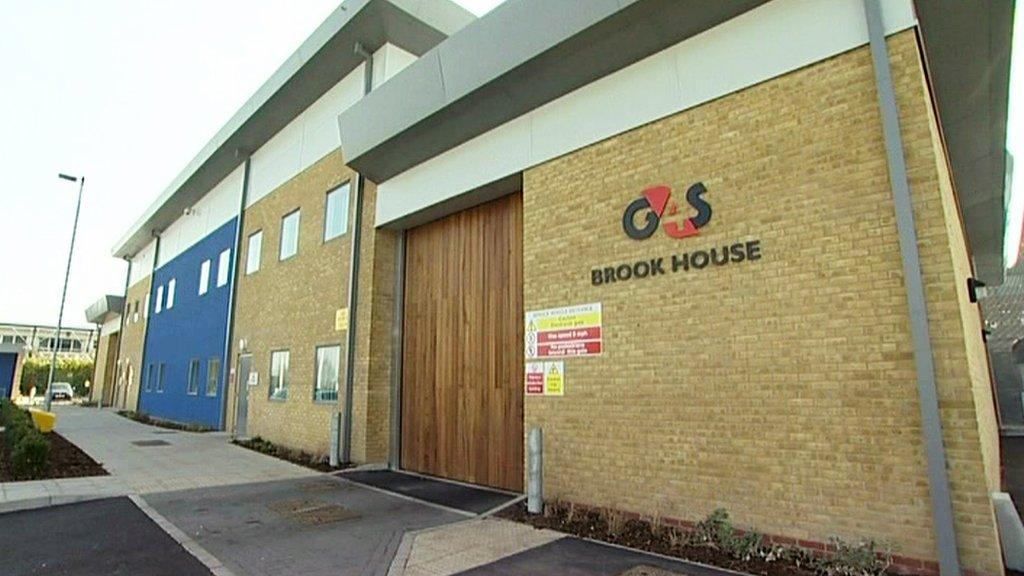G4S bosses 'warned' of poor detention centre staff culture
- Published

Nathan Ward warned managers some staff showed "a sense of roughness and the use of force"
A top manager at security company G4S has said he warned his bosses three years ago about the "poor culture" at an immigration detention centre where 10 employees have now been suspended.
The suspensions follow a BBC Panorama programme undercover investigation at Brook House, near Gatwick Airport.
Nathan Ward told Panorama that in 2014 he had warned bosses poor behaviour had been allowed to go "unchallenged".
G4S says it investigates all complaints and whistle-blowing rules are in place.
Mr Ward quit the company in April 2014 because he felt his managers were not acting on his concerns and he "couldn't cope".
He is now a priest.
'A sense of roughness'
Reading from notes made in 2014 ahead of a resignation meeting with managers, Mr Ward said: "So, for example, there is this one about the poor culture amongst Brook House residential staff and it's as though they're protected and that their behaviour goes unchallenged."
Speaking to the BBC three years later, he said: "The vast majority were good, decent people - but there was a group that actually concerned me on their relationships with detainees.
"It was around language that they used, a sense of roughness and the use of force, how force was used."

Nathan Ward is now a priest
Panorama says the investigation shows a toxic, brutal and failing environment where self-harming is common place.
The programme was approached by a worker at the centre, 21-year-old Callum Tulley, who agreed to secretly film what happened during his shifts.
The footage reveals suicide attempts, drug abuse and the results of violence inflicted by detainees on each other.
However, it also shows G4S staff mocking, verbally abusing and even physically assaulting those in their care.
'Dangerous and volatile'
Ahead of filming, Mr Tulley told the BBC: "I'll be going into a very dangerous and volatile situation and then I'll also be aware that I'm under immense pressure to actually film this incident whilst maintaining cover, whilst actually ensuring that no-one's harmed.
"Because if someone's there and he's hung himself, I can't be concentrating on filming this guy. I've got to save his life."
In one incident, Mr Tulley described how he had called other officers to help him restrain a 20-year-old man, who had been on suicide watch for two days and was trying to harm himself.

Callum Tulley, 21, agreed to go undercover at Brook House
"This officer comes in and just chokes him basically, and he just exerts all his pressure on from his hands and arms on to this guy's neck, and you see his eyes roll back, you see his eyes roll to the back of his head."
In total, 10 staff who worked at Brook House have now been suspended, among them a former G4S officer now at the Home Office.
The others include a female nurse, and six detention custody officers and two managers, all male.
Five other G4S staff have been placed on restricted duties.
Responding to Panorama's allegations, Home Office minister Brandon Lewis said: "The dignity and safety of all those in our care is of the utmost importance, and I am taking these deeply concerning allegations very seriously.
"We expect the highest standards and integrity of our contractors at all times, and the Home Office is working closely with G4S to ensure a full investigation is carried out and appropriate action is taken."
Nearly half the detainees are foreign national offenders (FNOs) who have reached the end of their sentences and are due to be deported.
The remainder are people from a wide range of backgrounds who, apart from immigration offences, may never have been in trouble.
They include people applying for asylum and others, such as doctors and students, whose visas have run out.
"The contrast between the asylum seekers and the migrants to the hard-line criminals, they... swarm like sharks around small fish," said Mr Tulley.
"They will just get eaten alive, just snapped up like that."
'Worse than prison'
G4S say it is not uncommon for 45% of detainees to be FNOs, and so it would be impossible to keep them segregated.
Like other immigration detention centres, Brook House was meant to hold people for only a few days, but now some spend months, even years there.
Mustapha Zitouni spent nearly a year in detention after finishing a prison sentence.
At one point, the stress of being held without an end in sight became too much for him.
Mr Tulley secretly filmed him protesting on suicide-prevention netting, razor blades in his hands.

Mustapha Zitouni staged a protest on the centre's suicide net
The catalyst for his protest was the last-minute cancellation of a flight home due to a simple administrative error at the Algerian embassy.
Now back in his home country, Zitouni says the uncertainty over how long they would be held made him and others desperate.
"The detention is... worse than the prison.
"In detention centre, you never know how long you are going to be: One day, one year or three or four years.
"The waiting game [is] the worst, the killer."
Zitouni's experience is not unusual - cancelled plane tickets cost the Home Office an estimated £1.4m a year, according to a 2016 report by the chief inspector of borders and immigration.
- Published1 September 2017

- Published10 March 2017

- Published24 March 2016
